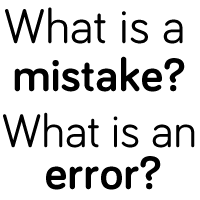
Mistakes and Errors #1
Before I start talking about my mistakes and errors, watch the following video and pay attention not only to my moves but also to my thoughts. By the way, I should mention that I am NOT replacing Danny Rensch. Chess.com held a contest a few months ago to find a new YouTube presenter to SUPPLEMENT the team (NOT TO REPLACE IT!) and there were a lot of amazing players and presenters who entered but in the end I won. I’m not bragging; I’m just letting you know.
First thing’s first: Talking and recording your thoughts while playing is an excellent training tool because you’ll know exactly what you were thinking and why you played certain moves. If you’re looking for FREE software to help you do this, you can download CamStudio here: http://camstudio.org/.
I am going to go over a few of my mistakes and errors and mention what I need to work on if I hope to improve if it’s not obvious. I’m not doing this because I feel I am the most important person in the world, I’m doing it because I want to show you how you should do it in case you want to do the same thing.
Before we see any of my actual mistakes or errors, let's go over the difference between a mistake and an error. I understand this dichotomy because I was an EFL (English as a Foreign Language) Teacher for more than a half a decade.
A mistake is a slip of the tongue. It’s when the learner or speaker (or in this case the chess player) knows what the rule is or what should be said or done but doesn’t apply it, say it or do it. For example, I know that the queen’s gambit is best, but instead of playing it I mouse slip and play c3. Or I know that I should take free material, but instead of skewering a couple of pawns, I move my king to f2 because I am playing fast. In both of the above cases, you might say to yourself “Darn it! Why’d I do that?!” With mistakes, you can correct them yourself during the game immediately after playing them or after the game when you analyze it by yourself (without a computer). The above examples on the board:
An error is something you do that’s wrong but you think is right. It’s when the learner or speaker (or in this case the chess player) believes what he is doing is correct because he learned the rule wrong, or because at some point he reconstructed the rule, mixed it with another one or applied a rule that he wasn’t supposed to. For example, instead of moving the bishop back to c4, maintaining a space advantage (because the d5 pawn jams up Black’s pieces), White plays Bd7 Qd7 and then c4 believing that his 3 vs 2 majority on the queenside will give him a pull, when in reality, Black’s central dominance (specifically his passed d-pawn) gives him the advantage. The above example on the board.
I’m not going to go over every mistake or error. You should try to do this yourself. If you go over all of your errors, you’ll probably spend weeks, even months (years for some people) analyzing all the awful moves you played.

12.d5?
I shouldn’t close the center. This was a knee-jerk reaction to …e5. I was like, “Argh, I’m gonna get FORKED! Push!” Really, I should’ve stayed calm and prevented the fork but maintained the tension. Only relieve the tension if you have a good reason. I have a space advantage and my pieces are fine so I can maintain the tension as long as I need to.
Also, when I keep the position fluid, he can’t play …f5. With a fluid center, …f5 becomes dangerous since f5 will only create holes and I’ll be able to open the position to attack those holes. By pushing I give him options and take my own options away. In short, inaccurate move.
Mistake or Error?
Mistake. I know that maintaining tension is generally correct especially when you have the choice of pushing and capturing but I let a knee-jerk reaction get the better of me.
Course of action: Pay more attention during the game. If you're making many mistakes during a game they might actually be errors(!) or you might need to play at a slower rate. I need to be more mindful when I play and not let knee-jerk reactions dominate my decisions.
13.Qc2
This is not a bad move. But during the game I immediately rejected Ne4. I thought of …f5 then …e4 forking d3 and f3. Actually, Ne4 is a pretty good move.
Maybe it doesn’t win but it’s a good move. It could land me in a sweet position. I was too quick to reject it. I should have continued the calculation to at least Neg5 where I could’ve seen the Knight fork on e6.
Mistake or Error?
Error. I have a serious problem with examining moves superficially and rejecting them instead of continuing. I need to cultivate this ability to calculate further. Calculate further, at least one or two plies further.
Course of action: Doing tactics slowly and mindfully will help a lot. A tactics book or the chess.com tactics trainer will be good for this.
17.Kh1?
Wrong move order, bozo. Just play g4 right away. By playing Kh1 I give my opponent the chance to play …h5 and complicate matters needlessly. I also fall behind in the pawn race because after Kh1 he can play …b5 and he’s playing the lever while I’m bumbling about with my King. In the game we both missed …b5. Instead my opponent played the weak …a4 lever.
Mistake or Error?
Mistake. I know the principle of flexibility which states that you should play the move you’re most likely to play and I have also heard that you should not delay playing a move which can be prevented. Heck, I probably heard it from myself. I should concentrate more during the game; I was too busy celebrating my lever to actually play it.
Course of action: Celebrate less when I get levers. Once again, be more mindful when playing.
27.Nd6?
Here, as pointed out by in the comments of the YouTube video, I can win the exchange with Bd7 Qd7 Nf6+ but I think Nd6 getting connected passed pawns is better. Both moves are inferior to Be6 followed by Rg6. My pieces’ alignment is beyond excellent. I should have been alerted to the tactical possibilities.
Mistake or Error?
Error. I need to acquire a really good antenna. A tactics antenna that is. With a good tactics antenna you can sense tactics which is helpful because you’ll know when to start looking deeply at concrete variations. So I need to work on spotting the signals for tactics (there are seven [7]).
Course of action: I can do that by going through the signals, and in this case, seeing more examples of alignment. A tactics book or the tactics trainer on chess.com can help me do that.
There are a few more mistakes and errors from me but right there seems like a good point to stop. My opponent also made quite a few mistakes and committed quite a few errors. 17…a5? was bad. 17…b5 would’ve been better. Also, 21…fg4?? was atrocious. He should’ve kept the tension!! Instead he artificially isolated his e-pawn. 21…Ng7 was infinitely better. All in all, it was an instructive game and I hope that you at least learned something from that game. I know I did and that's the ultimate goal of going over your own games.
The two things I am going to really work on: tactics and calculation. I can work on those things by doing tactics mindfully. Instead of just doing them for the sake of doing them I can ask myself what signals would alert me to the presence of a tactic in a real game and I can see it all the way through to the end before I make a move or check the answer.
Finally, I want to close this article by letting you know why it's important to know the difference between mistakes and errors. If you're making a lot of mistakes, then you need to slow it down. Play a slower time control if you keep saying, "Doh!" during your games. If you're committing an error (which is usually pointed out by a computer engine like Houdini, Stockfish, or Fritz) then you need to recognize the underlying problem if you really want to correct it.









